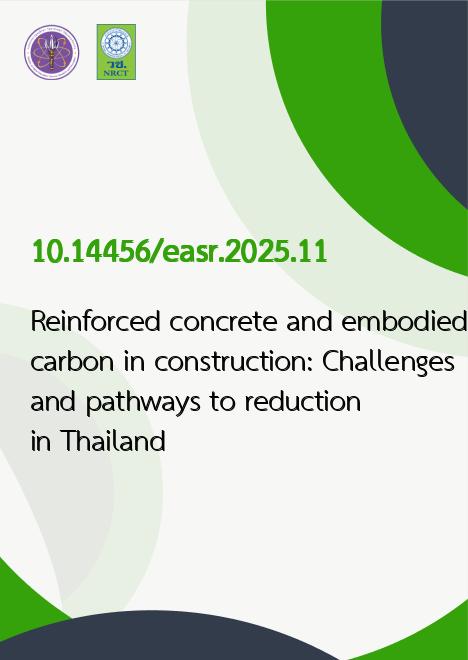
|
Reinforced concrete and embodied carbon in construction: Challenges and pathways to reduction in Thailand |
|---|---|
| รหัสดีโอไอ | |
| Creator | 1. Surapong Liwthaisong 2. Tanayut Chaithongrat 3. Preenithi Aksorn |
| Title | Reinforced concrete and embodied carbon in construction: Challenges and pathways to reduction in Thailand |
| Publisher | Faculty of Engineering, Khon Kaen University |
| Publication Year | 2568 |
| Journal Title | Engineering and Applied Science Research |
| Journal Vol. | 52 |
| Journal No. | 2 |
| Page no. | 125-134 |
| Keyword | Embodied carbon emissions, Emission reduction strategies, Life cycle assessment, Sustainable construction, Reinforced concrete structure |
| URL Website | https://ph01.tci-thaijo.org/index.php/easr/index |
| Website title | Engineering and Applied Science Research |
| ISSN | 2539-6161 |
| Abstract | The increasing demand for construction in Thailand, driven by urbanization and infrastructure development, has heightened the urgency of addressing embodied carbon emissions in reinforced concrete projects. This study evaluates the life cycle carbon emissions of a six-story outpatient department building, focusing on the manufacturing, transportation, and construction stages. Data were collected through stakeholder interviews and analysis of project-specific documents, such as bills of quantities and construction plans. Results reveal that the manufacturing stage contributes 92.75% of total emissions, with concrete and steel as the primary sources, accounting for 6.506 kt CO?eq. Transportation and construction contribute 6.41% and 0.84%, respectively. The study identifies practical strategies for reducing embodied carbon, including material substitution with supplementary cementitious materials, optimizing logistics, and improving energy efficiency in construction practices. These strategies not only mitigate environmental impacts but also address economic and quality considerations, ensuring feasibility in the local context. The findings provide actionable insights for policymakers and construction professionals to integrate low-carbon practices, contributing to the national and global goals of sustainable development. This research offers a comprehensive framework for reducing embodied carbon emissions while maintaining economic viability and construction quality, positioning Thailand as a leader in sustainable construction. |
